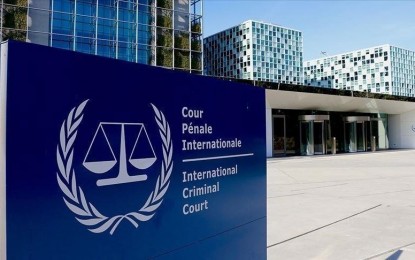
International Criminal Court (Anadolu)
MANILA – Not rejoining the International Criminal Court (ICC) is a prerogative of President Ferdinand Marcos Jr. and has the support of the Office of the Solicitor General.
As chief architect of the country’s foreign policy, it is Marcos’ decision to determine what international organizations the Philippines may join, according to Solicitor General Menardo Guevarra on Tuesday.
“I suppose the President’s primary consideration is always the best interests of our country, with utmost regard for our national sovereignty,” Guevarra said in a statement.
The Philippines withdrew membership from the ICC in 2018 under President Rodrigo Duterte.
On Monday, Marcos declared “the Philippines has no intention of rejoining the ICC,” shortly after a meeting that discussed investigation on illegal drugs operations.
The ICC will reopen its probe and asked the country to submit its comment by September 8.
“Considering the importance of the ICC case not only to the individuals named in the complaint but also to the country as a sovereign state, the President's legal team should indeed give this matter their most serious and careful consideration,” Guevarra said.
The Department of Justice (DOJ) said it is poring over investigations of the previous administration regarding the campaign against illegal drugs.
“I’m collating reports on the investigations assigned by then-DOJ Secretary Guevarra,” Remulla said in a text message.
Senators Ronald Dela Rosa and Francis Tolentino likewise support the President’s stand on the ICC membership.
"Naisip ko kasi (I was thinking), if the US, Russia, China, Israel, and other countries refused to join ICC, I don’t see any compelling reason why we are going to rejoin and allow them to meddle with our internal affairs, which is tantamount to surrendering to them our sovereignty as a nation,” dela Rosa said in an interview.
Dela Rosa, a former national police chief during the Duterte administration, said the ICC should remember that it has no jurisdiction over the Philippines.
"Is it necessary? Are we committing a crime against humanity? Is there a genocide happening in the Philippines? Are we committing a serious crime of aggression? I don't think so na may nangyayaring ganoon (that there is something like that happening)," he said.
Tolentino, in a recent statement, said President Marcos' decision is reflective of the two cornerstones of the country's sovereignty -- independent foreign policy and national security.
"The right to be an equal member in the comity of nations is reflective of our sovereignty as a nation. Our national courts should have the primacy in dispensing justice and this is even recognized by the ICC's own 'complementarity principle," he said.
DOJ's move
In October last year, the DOJ released information on an initial batch of 52 cases it is reviewing as part of the government’s policy of transparency on the anti-illegal drugs campaign.
The matrix included docket numbers, names of deceased suspects, places and dates of the incidents, and the review panel’s summary of observations.
Among the 52 cases, the most number of deaths in a single incident involved an operation in Liloy, Zamboanga del Norte on July 29, 2016 that resulted in the death of three persons.
According to the police version, the suspects on board a vehicle refused to stop at a checkpoint and opened fire on the officers.
The DOJ review panel noted that according to the medico-legal report, the victims appeared to have been shot at close range.
The Philippine National Police-Internal Affairs Service ordered the dismissal from the service of those involved.
The DOJ previously said the disclosure was meant to assure the families and loved ones of the deceased that the suspects and the circumstances of each death are undergoing a determination of possible criminal liabilities. (With a report from Leonel M. Abasola/PNA)
